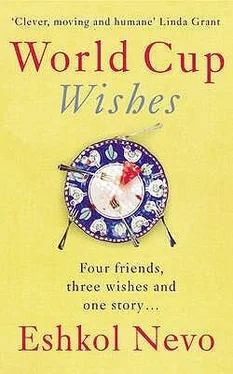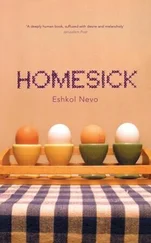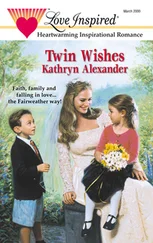Ah … guys … I’m dying of thirst … Amichai started mumbling, then added, I have an idea! Can’t we stop somewhere and buy something to drink? But Churchill said no and started walking again, and we followed him because we always followed him, not only because we were in awe of him, but also because of his enormous lust for life that had something contagious and beautiful and joy-inspiring about it, and really, after a short walk on Frishman Street — which Amichai insisted was named after the Hapoel Tel Aviv basketball player, Amos Frishman, and Ofir said that didn’t make sense, because Amos Frishman was alive and they don’t name streets after living people — we heard dance music coming from a flat and Churchill said, come on, we’re going up there, and Amichai said, what do you mean? We don’t know anyone there, that’s just the point, Churchill explained, we don’t know anyone in this city, so we can be whoever we feel like being, and Ofir said that if they ask, we’ll say we’re friends of Daniel, because Daniel is both a guy’s name and a girl’s name, and it’s an international name too, and I looked at my watch again and remembered the straight, monotonous section of the road after Hadera where you could easily fall asleep while driving, and I thought there was something embarrassing, not to mention humiliating, about crashing a party, but still, I trailed up the steps behind them to the third floor, holding my nose so the stench of urine coming from the walls and the steps and the windows wouldn’t make me vomit, and I thought, I wonder what a party in this city is like, it’s probably different, the people here must dance differently, but after Churchill pressed the buzzer and we heard a mechanical bird cheep and the front door opened, it turned out that there was no big party going on behind it, there was just one girl with wild hair and a wild neckline who gave us a look that was both dead and hungry for love, a look I know very well today, after ten years in this city, but then, it still amazed me with the inner contradiction it reflected.
Did you want something? she asked, pulling back her hair into a wobbly ponytail. Her tone was surprisingly matter-of-fact, as if she were used to people ringing her bell at four-thirty in the morning. As if she were a waitress in a café and we were her customers. We’re friends of Daniel … Ofir began, but Churchill interrupted him and said, the truth is that we heard music on the street and just … thought there was a party going on here. A party? the girl said, giving Churchill a head-to-toe look that lingered a bit on his broad chest. There actually is a party going on here, she went on, but it’s a … private party. Very private, Churchill said and smiled at her, pointing to the empty space behind her. Yes, she smiled back at him, very private is a good way to put it. And … is there any way we can join this ‘very private’ party? Churchill asked as he leaned against her doorframe. She let down her hair, then pulled it back into a ponytail again and said, I don’t know. I don’t really know any of you. Ah, that’s not a problem, Churchill said. I’m Yoav. And these are my friends from the pilots training course, Ofir, Amichai and Yuval. Pilots training course? the girl said, surprised but not very enthusiastic, as if she’d already heard every possible lie. Yes, Churchill said, we have a forty-eight-hour pass, and we’ve been looking all night for a place to dance, but without any luck. Till we came here. To you.
I have no idea how you did it, Yoav, but you’ve managed to get my sympathy, the girl said and moved back a little so we could walk in. As I passed her, my elbow rubbed lightly against her waist and I got a whiff of her perfume, which was very different from the ones used by the Haifa girls we went out with, and I had the urge to turn around and bury my head between her breasts for a few seconds and inhale that bitter smell, but two songs later, she was pulling Churchill into the bedroom, and the three of us were left behind, in the living room. We kept on trying to convince ourselves we were dancing, facing each other, but then we realised how ridiculous that was, so we turned the music down and sat on the black leather sofa in the middle of the living room, and Amichai shot a quick glance at the bedroom door and said, that’s something else, isn’t it? And Ofir said, right out of the movies, and I said, maybe you really should put it in your film, Ofir, because years ago, before he wrote down his World Cup wish to write a book, Ofir had said that after the army, he wanted to make a film about the four of us, something like Late Summer Blues , which had been such a big hit, and every once in a while he’d bring a video camera when we went to the beach and tape us playing volleyball, or puffing out our chests on the waves, and he’d say he was ‘gathering material’, and we were all sure that he really would make a film in the end because he was obviously bursting with talent and there wasn’t a single Purim play at school or in the Scouts he didn’t write, and in our junior year, he won second place in the national screenplay writing contest, when the first place winner was a kid from the Talma Yellin performing arts high school, whose surname was suspiciously the same as one of the judges’.
It’s not a bad idea to put a scene like this into the film, Freed, he said, patting me on the shoulder. Not bad at all. Even though … none of this will be worth a damn if one of us doesn’t die in the army. Someone has to die in the army, he sighed, otherwise I don’t have a film. But why? Amichai said angrily, perhaps because his father really did die in the army, and Ofir again raised his argument that every successful movie or book in Israel since the state came into being has a dead soldier in it, and the part about the dead soldier is always the most moving part of the movie or book. Zvilich in Late Summer Blues ? Ori in He Walked in the Fields ? Yehoram Gaon in Operation Thunderbolt ? Ofir raised a finger for each example, then kept piling on details of cases that clearly proved his argument, till Amichai fell asleep, and he wasn’t satisfied till I promised him that if none of us died spontaneously in the army, I was ready to take on the job. His head dropped onto the wide shoulders of his eternal adversary and I was left alone in that girl’s living room. I didn’t know her name, but I could already tell you what kind of sounds she made when she had an orgasm. Or faked it.
I got up and walked around her flat, which didn’t look like any I’d ever seen, and not like any I’d ever dreamed of either. It had huge paintings on the walls, all in intensely bright colours. Not posters of paintings you buy for fifty shekels, but original works. I had the feeling she painted them herself, even though I had no evidence of that. There were some very ugly papier mâché sculptures on her bookshelves and I guessed she made them, too. I didn’t see one familiar book, except for The Little Prince , and that made me feel like a philistine. There were lots of art books and poetry books, and very few novels. I took a small book from the poetry section. It was titled Poems of Love and Sex by David Avidan, and I remembered our literature teacher mentioning his name once or twice, but we never studied any of his poems. I read the first one standing up, and then I couldn’t sit down. ‘A woman so beautiful and a man so ugly/And she’s married to him. A crime’ — were the first lines to hit me. ‘Two Sex Toys’ was the name of the poem on the next page. I didn’t know if I liked these poems, but I couldn’t stop rolling the new phrases around on my tongue: ‘Lolita Splendita’, ‘A reliable little sex animal’, ‘A strong moment of weakness’, ‘We rose, ready to go’. I even copied a few of them down on a piece of paper I found in the kitchen so I could show them to Churchill later, on the drive home, and hear what he thought of them.
Читать дальше












